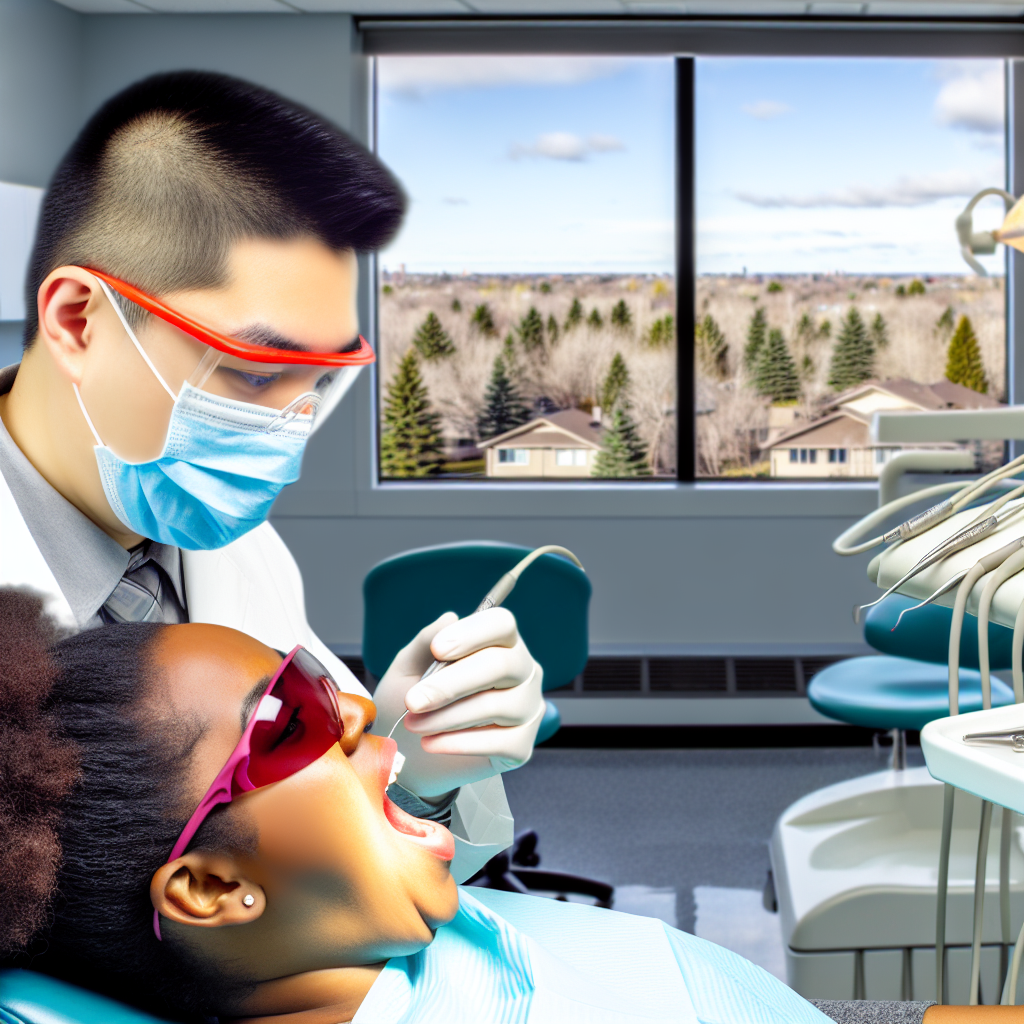Dentists Only Focus on Teeth Cleaning
Understanding the Role of Dentists
Dentists play a much broader role than just cleaning teeth.
They are responsible for diagnosing oral conditions.
Additionally, dentists develop treatment plans for various dental issues.
Consequently, their scope includes preventive, restorative, and aesthetic dentistry.
Preventive Care and Education
Prevention is crucial in the dental profession.
Dentists educate patients on oral hygiene practices.
They also provide guidance on diet and lifestyle choices.
Moreover, routine check-ups help catch problems early.
Restorative Treatments
Restorative dentistry encompasses a variety of procedures.
Dentists perform fillings for cavities and more complex procedures.
These include crowns, bridges, and dentures.
Each service aims to restore function and appearance.
Aesthetic Dentistry
Aesthetics is an important aspect of modern dentistry.
Dentists offer services to enhance the smile.
Whitening, veneers, and orthodontics improve appearance significantly.
Each of these procedures contributes to patient confidence.
Specialized Areas of Dentistry
Many dentists specialize in specific fields.
Examples include periodontics, endodontics, and oral surgery.
Each specialization requires extensive training and education.
This diversity reflects the complexity of oral health.
Common Misconceptions About the Dental Profession
All Dental Work is Painful and Uncomfortable
One major misconception people have is that all dental procedures cause pain.
This belief can discourage individuals from seeking necessary dental care.
In reality, modern dentistry focuses heavily on patient comfort.
The advent of advanced anesthetics has greatly reduced discomfort.
Moreover, many dental procedures are quick and minimally invasive.
Unlock Your Career Potential
Visualize a clear path to success with our tailored Career Consulting service. Personalized insights in just 1-3 days.
Get StartedUnderstanding Dental Anesthesia
Dentists use various types of anesthesia to manage discomfort.
Local anesthesia numbs specific areas during the procedure.
This allows patients to remain awake and comfortable.
In some cases, sedation dentistry offers additional relaxation for anxious patients.
Patients can choose sedation options based on their comfort levels.
Innovations Making Dentistry Comfortable
Technological advances have revolutionized dental treatments.
Laser dentistry, for instance, minimizes pain in many procedures.
Additionally, these lasers reduce bleeding and swelling.
Furthermore, digital dentistry enhances precision and reduces chair time.
This results in a quicker and more comfortable experience for patients.
Addressing Patient Concerns
Communication is key to ensuring patient comfort during procedures.
Dentists often discuss treatment options with patients beforehand.
They encourage patients to voice concerns and ask questions.
This open dialogue helps to alleviate anxiety about procedures.
Ultimately, understanding the process can make dental visits less intimidating.
Misconception: Dental Care is Only Necessary When Problems Arise
Preventive Care is Essential
Dental care is not just about problems and solutions.
Routine check-ups help identify issues before they escalate.
Preventive care includes professional cleanings and examinations.
These visits are crucial for maintaining oral health.
The Importance of Regular Visits
Many people think they only need to visit the dentist when in pain.
However, regular dental visits can prevent cavities and gum disease.
They also allow for early detection of oral diseases.
By visiting the dentist regularly, patients can avoid costly treatments later.
Good Oral Hygiene Practices
Good dental care is a combination of home and professional hygiene.
Brush twice a day and floss daily for optimal results.
Use fluoride toothpaste to strengthen enamel and prevent decay.
Diet also plays a vital role in maintaining oral health.
Long-term Health Benefits
Excellent dental care contributes to overall health.
Oral health is linked to conditions like heart disease and diabetes.
Maintaining good dental habits can improve overall well-being.
Healthy teeth promote better nutrition, which supports the immune system.
Find Out More: How Kinesiology Supports Mental and Physical Wellness
Misconception About Oral Surgery and Dentists
Understanding the Role of Dentists
Many people believe that any dentist can perform oral surgery.
This misconception stems from a misunderstanding of dental education and training.
In reality, dental professionals have specialized areas of expertise.
General dentists focus on preventive care and basic treatments.
On the other hand, oral surgeons undergo extensive training specifically in surgical procedures.
Oral Surgery Training
Oral surgeons complete additional years of residency after dental school.
This training equips them with the skills necessary to perform complex surgeries.
They are prepared to manage complications and provide anesthesia safely.
Consequently, oral surgery requires a specific set of competencies.
Types of Oral Surgery
Various procedures fall under the category of oral surgery.
- Wisdom teeth removal
- Jaw alignment surgery
- Facial injury repair
- Dental implants
- Bone grafting
These procedures require specialized knowledge and experience.
Consulting the Right Professional
It is essential to consult an oral surgeon for surgical needs.
A referral from your general dentist can help you find a qualified professional.
Choosing the right specialist ensures better outcomes and safer procedures.
You Might Also Like: The Growing Demand for Dentists Across Canada
Dental Insurance Coverage Misconceptions
Understanding the Basics of Dental Insurance
Many people believe dental insurance covers all procedures equally.
This misconception can lead to unexpected out-of-pocket expenses.
In reality, insurance plans vary significantly in coverage and benefits.
Most plans prioritize preventive care over extensive treatments.
Therefore, routine check-ups often have lower copayments than surgeries.
What Procedures Are Typically Covered?
Preventive services like cleanings and exams are usually covered at 100%.
Basic restorative procedures such as fillings often have partial coverage.
In contrast, major procedures like crowns or root canals usually involve higher costs.
Patients should carefully review their specific plan details to avoid surprises.
The Role of Deductibles and Maximums
Dental insurance often includes deductibles that must be met first.
Annual maximums also limit the total amount covered by the insurance.
If patients reach their maximum, they must pay the full cost afterward.
This cap varies widely among different insurance plans.
Non-Covered Procedures and Treatments
Unfortunately, many treatments like cosmetic dentistry are not covered.
This includes procedures like teeth whitening or veneers.
Patients should stay informed about what their insurance does not cover.
Understanding these limits can help in planning dental expenses.
Consulting with Your Dental Office
Dental offices often help patients navigate insurance coverage.
They can assist in understanding insurance terms and conditions.
Additionally, they may offer financing options for uncovered treatments.
Open communication with your dentist is vital for effective planning.
Find Out More: The Path to Dentistry: Education and Licensing Guide

Good Oral Health Can Be Maintained Without Professional Dental Visits
Understanding the Importance of Professional Care
Many believe that good oral hygiene alone suffices for maintaining oral health.
However, this misconception can lead people to skip dental visits.
Regular dental check-ups detect issues early and prevent serious problems.
Professional cleanings remove plaque and tartar that daily brushing can’t reach.
The Risks of Neglecting Dental Visits
Neglecting professional care increases the risk of gum disease.
Additionally, untreated cavities can lead to more significant health issues.
In severe cases, these problems can result in tooth loss.
Benefits of Routine Dental Check-Ups
Scheduling regular visits ensures a thorough examination of your oral health.
Dental professionals provide personalized advice for maintaining proper hygiene.
They can identify risk factors based on your dental history.
Professional Cleaning vs. At-Home Care
Your oral hygiene routine is vital but not sufficient on its own.
Professional cleanings remove stubborn tartar that can cause decay.
Consequently, this helps in maintaining overall oral health.
Commitment to Your Oral Health
Good oral health requires a partnership between you and your dentist.
Regular visits complement your at-home oral care routine.
Thus, commit to a schedule of professional dental visits for optimal health.
Learn More: How to Become a Podiatrist in Canada
Pediatric Dentists Are Not Just for Children
Understanding the Role of Pediatric Dentists
Pediatric dentists specialize in treating children, but their skills extend beyond youth.
They possess a deep understanding of dental growth and development.
This enables them to treat dental issues that can affect adults.
Dental Care for Special Needs Patients
Pediatric dentists also cater to individuals with special needs.
They are trained to manage various behavioral and medical conditions.
This expertise makes them suitable for caring for both children and adults with disabilities.
Transitioning from Childhood to Adulthood
Many pediatric dentists provide care until a patient reaches adulthood.
They ensure a smooth transition to general dentistry.
This continuity of care fosters trust and familiarity.
The Importance of Preventive Care
Pediatric dentists emphasize preventive care across all age groups.
Moreover, they educate patients and parents on maintaining oral health.
This proactive approach encourages lifelong dental hygiene habits.
Customized Treatment Plans
Pediatric dentists create treatment plans tailored to individual needs.
They consider a patient’s unique dental and medical history.
This personalized care contributes to better outcomes for both kids and adults.
Misconception About Cosmetic Dentistry
Understanding Cosmetic Dentistry
Many people believe cosmetic dentistry is purely for aesthetic reasons.
This misconception overlooks the important health benefits of these procedures.
In reality, cosmetic dentistry can enhance both appearance and functionality.
Benefits Beyond Aesthetics
Cosmetic procedures can improve oral health significantly.
For example, veneers can protect damaged teeth from further decay.
Braces not only straighten teeth but also ease jaw pain and improve bite.
Moreover, teeth whitening boosts confidence, leading to better mental health.
Examples of Necessary Cosmetic Procedures
- Dental crowns can restore strength to weak or broken teeth.
- Bonding can fill cavities while matching the tooth color.
- Professional whitening can eliminate deep stains caused by medications.
- Orthodontics can correct alignment issues that affect chewing.
Changing Perceptions
It’s crucial to recognize that cosmetic dentistry is often necessary.
It supports overall health by addressing both form and function.
Patients should consult dental professionals to explore options.
Understanding this can prevent potential oral health issues in the future.
Additional Resources
Health Care Students’ Perspectives on … – JMIR Medical Education




